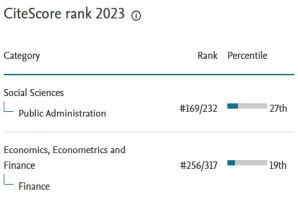A fenntarthatóság új szempontjai: a nem pénzügyi jelentések európai gyakorlatának elemzése
DOI:
https://doi.org/10.35551/PFQ_2022_2_2Kulcsszavak:
nem pénzügyi jelentés, fenntarthatósági jelentések, NFRD, ESG, ESG-szemlélet, F64, F65, G11, G15, G2, G3, K20, K32, O16Absztrakt
A környezeti (E), szociális (S) és kormányzati (G) kritériumoknak való megfelelésről a vállalatoknak az ún. nem pénzügyi információkra vonatkozó közzétételek szabályrendszere (keretrendszer) szerint kell beszámolniuk. Tanulmányunkban azt vizsgáljuk, hogy milyen jellemzői vannak az ESGjelentéseknek, azok tükrözik-e az egyes piaci szereplők fenntarthatósági tevékenységét, és melyek a kérdéskör legkurrensebb problémái. Kutatásaink során arra a megállapításra jutottunk, hogy számos egymással párhuzamosan létező – eltérő adatok közzétételét előíró – kötelező és önkéntes közzétételi előírás van, amelyek ezért csak részlegesen alkalmasak a vállalkozások fenntarthatósági tevékenységének az összehasonlítására. A vállalati jelentések egy része emellett csak alapelvi szinten foglalkozik az ESG-kérdésekkel, és csak kisebb hányaduk számol be konkrét intézkedésekről és elért eredményekről. Éppen ezért megfogalmaztuk azokat a javaslatokat is, amelyek a vállalatok ESG-mutatók alapján történő összemérhetőségét támogatják.
Hivatkozások
A. Azadegan, S. Golara, A. Kach, N. Mousavi (2018). Corporate environmental investments: A cross-national study on managerial decision making, International Journal of Production Economics, 199, pp. 47–64
A. Bové, D. D’Herde, S. Swartz (2017). Sustainability’s deepening imprint, McKinsey sustainability. December, 1–12, McKinsey & Company. In: https://www.mckinsey.com/businessfunctions/sustainability/our-insights/sustainabilitysdeepening-imprint
Aggarwal, R., Dow, S. (2013). Corporate governance and business strategies for climate change and environmental mitigation. In: Entrepreneurship, Finance, Governance and Ethics. Springer: Dordrecht. pp. 315–340
Arayssi, M., Jizi, M. I. (2018). Does corporate governance spillover firm performance? A study of valuation of MENA companies. Social Responsibility Journal
B. Ageron, A. Gunasekaran, A. Spalanzani (2012). Sustainable supply management: An empirical study, International Journal of Production Economics, 140 (1), pp. 168–182
B. R. Chabowski, J. A. Mena, T. L. Gonzalez- Padron (2011). The structure of sustainability research in marketing, 1958–2008: A basis for future research opportunities, Journal of the Academy of Marketing Science, 39 (1), pp. 55–70
Berlinger, E., Keresztúri, J. L., Tamásné Vőneki, Zs. (2018). A cross-country analysis of operational risk: The effect of the freedom of press. In PRMIA Hungary Chapter Éves Konferenciája, pp. 8
Cai, Y., Pan, C. H., Statman, M. (2016). Why do countries matter so much in corporate social performance? Journal of Corporate Finance, 41, pp. 591–609
Del Bosco, B., Misani, N. (2016). The effect of cross-listing on the environmental, social, and governance performance of firms. Journal of World Business, 51(6), pp. 977–990
Demers, E., Hendrikse, J., Joos, P., Lev, B. (2021). ESG did not immunize stocks during the COVID‐19 crisis, but investments in intangible assets did. Journal of Business Finance & Accounting, 48 (3–4), pp. 433–462, https://doi.org/10.1111/jbfa.12523
Domokos L. (2019a): Vállalatirányítás a közérdek szolgálatában. In: Parragh, Bianka (szerk.) Ösztönző állam – hatékonyabb vállalatok. Budapest, Magyarország: Akadémiai Kiadó. 105
Domokos L. (2019b). Ellenőrzés – a fenntartható jó kormányzás eszköze. Akadémiai Kiadó
Dudás F., Naffa H. (2021). Az ESG mutatók vállalati válságállóságra gyakorolt hatása a koronavírus járvány alatt. Gazdaság és Pénzügy, 8(4) 386–405. oldal, https://doi.org/10.33926/GP.2021.4.2
Eccles, Robert G., Ioannou, I., Serafeim, G. (2014). The Impact of Corporate Sustainability on Organizational Processes and Performance, Management Science, 60(14), https://doi.org/10.1287/mnsc.2014.1984
Fekete I. (2022). A döntéshozatal támogatása a kockázatmenedzsment eszközeivel. Pénzügyi Szemle, 67(1. különszám), 27–46. oldal, https://doi.org/10.35551/PSZ_2022_k_1_2
Gyura G. (2020). ESG és bankszabályozás: haladni kell a korral. Gazdaság és Pénzügy, 7(4) 388
Halbritter, G., Dorfleitner, G. (2015). The wages of social responsibility – Where are they? A critical review of ESG investing. Review of Financial Economics, 26, pp. 25–35
Liang, H., Renneboog, L. (2017). On the foundations of corporate social responsibility. The Journal of Finance, 72(2), pp. 853–910
Lys, T., Naughton, J. P., Wang, C. (2015). Signaling through corporate accountability reporting. Journal of Accounting and Economics, 60, pp. 56–72, https://www.sciencedirect.com/science/article/pii/S0165410115000191
M. Zhuang, W. Zhu, L. Huang, W. T. Pan (2021). Research of Influence Mechanism of Corporate Social Responsibility for Smart Cities on Consumers’ Purchasing Intention, Library Hi Tech, In: https://www.emerald.com/insight/content/doi/10.1108/LHT-11-2020-0290/full/html
Matolcsy Gy. (2020). A versenyképesség mint a fenntarthatóság meghatározó feltétele. Pénzügyi Szemle, 65(2. különszám) 7–24. oldal, https://doi.org/10.35551/PSZ_2020_k_2_1
P. Bansal (2005). Evolving sustainably: A longitudinal study of corporate sustainable development. Strategic Management Journal, 26 (3), pp. 197–218
Primecz, H., Havran, D., Lakatos, Z. (2019). How Does Female Presence on the Management and Supervisory Boards Impact the Performance in CEE? Academy of Management Annual Meeting Proceedings, (1), 1–1, https://doi.org/10.5465/ambpp.2019.10602abstract
S. Hoejmose, S. Brammer, A. Millington (2012). “Green” supply chain management. The role of trust and top management in B2B and B2C markets. Industrial Marketing Management, 41 (4), pp. 609–620
Sarkis, J. (2001). Manufacturing’s role in corporate environmental sustainability. International Journal of Operations and Production Management, 21, pp. 666−686
Savitz, A.W., Weber, K. (2006). The triple bottom line: How today’s best-run companies are achieving economic, social and environmental success – and how you can too. San Francisco, CA: Jossey-Bass
Siew, R. Y., Balatbat, M. C., Carmichael, D. G. (2016). The impact of ESG disclosures and institutional ownership on market information asymmetry. Asia-Pacific Journal of Accounting & Economics, 23(4), pp. 432–448
Szennay, Á., Szigeti, C. (2019). A fenntartható fejlődési célok és a GRI szerinti jelentéstétel kapcsolatának elemzése. Vezetéstudomány – Budapest Management Review, 50 (4). 33–43. oldal, https://doi.org/10.14267/VEZTUD.2019.04.04
De Toledo, R. F., Miranda Junior, H. L., Farias Filho, J. R., Costa, H. G. (2019). A scientometric review of global research on sustainability and project management dataset. In: Data in Brief, VL-25, https://doi.org/10.1016/j.dib.2019.104312
##submission.downloads##
Megjelent
Hogyan kell idézni
Folyóirat szám
Rovat
License
Authors assign copyright to Pénzügyi Szemle / Public Finance Quarterly. Authors are responsible for permission to reproduce copyright material from other sources.











